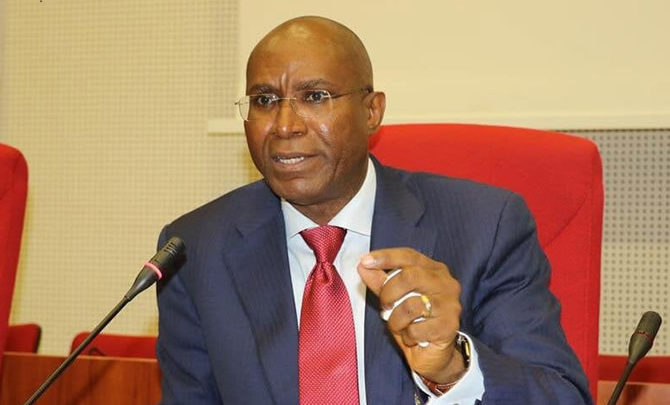
- The Deputy President of the Senate, Ovie Omo-Agege, has said the legislative house is not happy about the growing security challenges facing the country, leading to loss of lives and valuables in many states.
The Deputy President of the Senate, Ovie Omo-Agege, has said the legislative house is not happy about the growing security challenges facing the country, leading to loss of lives and valuables in many states.
Omo-Agege met with President Muhammadu Buhari at the Presidential Villa, Abuja, on Monday and spoke with State House correspondents after the meeting which held behind closed doors.
He said he only came to greet Buhari.
Speaking on the security issues in Nigeria, the lawmaker stated that the matter had been raised on the floor of the Senate a number of times, where the federal legislators expressed their disapproval of the current situation.
Omo-Agege added, “We have taken a position on this (insecurity). We are not happy like most Nigerians about what is going on in places, most especially Zamfara State.
“We believe that the head of the security architecture in Zamfara State, being the Commissioner of Police, can do more than they have already done.
“We are encouraging them to do that because Mr President has provided everything that ought to be given to them, everything in terms of funding received, in terms of the acquisition of the weapons that have been provided for them.
“It is now left for them to justify the positions they hold in Zamfara and other states.”
However, he added that the Senate would support any security initiative introduced by the executive to tackle insecurity, especially banditry, kidnapping and armed robbery.
He stated that a recent idea mentioned by Vice-President Yemi Osinbajo that the Federal Government would deploy soldiers in many locations to confront the criminals was welcomed by the Senate.
Reacting to a question on whether soldiers could be deployed, Omo-Agege said, “Absolutely. On a good day, it is not something we would encourage because as much as possible, you would want to keep the military in the barracks, but because of the exigencies of the moment, we have no choice but to encourage that.
“Nigerians need to be assured of their safety at all times; that is the essence of governance as guaranteed by the constitution. Therefore, as canvassed and indeed ordered by the Vice-President, that we have the army provide security at the checkpoints, if that will go a long way in preventing kidnapping and banditry, why not?”
…N’Assembly’ll review obsolete laws, says Omo-Agege
Sunday Aborisade, Abuja
The Deputy President of the Senate, Ovie Omo-Agege, has said the National Assembly will focus more on reform and the review of the obsolete laws in the 1999 Constitution.
The Senator said this at the 2019 Law Week of the Abuja branch of the Nigerian Bar Association.
According to him, the obsolete laws in place since independence will be amended.
Omo-Agege said in a statement by his Chief Press Secretary, Ezrel Tabiowo, the set objectives could be achieved when the three arms of government work together.
The lawmaker, who was represented at the event by his Deputy Chief of Staff, Mr Alex Onwuadiamu, said adopting the approach would optimally guarantee improved performance by both chambers of the National Assembly.
He said it would also ensure effective oversight of ministries, departments and agencies of government.
He said, “The National Assembly will symbiotically strengthen their separate and joint capacities to discharge their constitutional duties as one independent arm of government working in harmony with the executive and judiciary.
“It is essential to establish a non-partisan bi-camera mechanism towards achieving a more harmonious, productive and transparent National Assembly.
“This will promote good measurement and coordination of the performance of each chamber’s legislative, representation and oversight duties.
“It will also guarantee the issuance of objective periodic performance measurement and coordination reports to guide the leadership of both chambers.”
Omo-Agege said legislative interventions by the National Assembly would look at critical areas such as elections, education, security, finance, oil and gas, manufacturing and industry, agricultural, science, communications, technology and media.
He listed other areas requiring the priority of the National Assembly as transportation, solid minerals, tourism, entertainment business, health, power, infrastructure, housing; youths, children, women, sports, maritime, judiciary, public enterprises, labour traditional institutions, inter-ethnic and inter-religious harmony and foreign affairs, among others.



